Related Research Articles
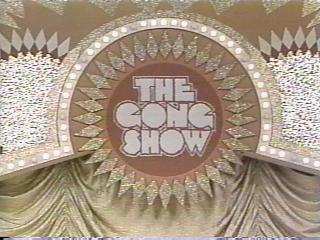
The Gong Show is an American amateur talent contest franchised by Sony Pictures Television to many countries. It was broadcast on NBC's daytime schedule from June 14, 1976, through July 21, 1978, and in first-run syndication from 1976 to 1980 and 1988 to 1989, and was revived in 2017 for broadcast on ABC. The show was created and originally produced by Chuck Barris, who also served as host for the NBC run and from 1977 to 1980 in syndication. Its most recent version was executive-produced by Will Arnett and hosted by Tommy Maitland, a fictional character performed by Mike Myers. The Gong Show is known for its absurdist humor and style, with the actual competition secondary to the often outlandish acts presented; a small cash prize has typically been awarded to each show's winner.
Fridays was a late-night live comedy show that aired on ABC on Friday nights from April 11, 1980, to April 23, 1982.
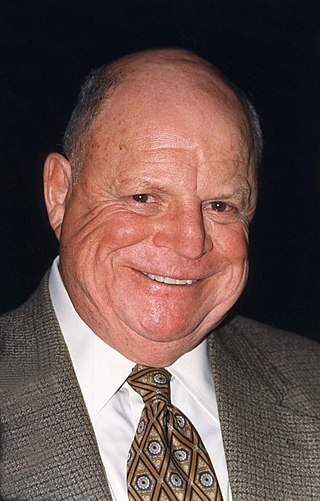
Donald Jay Rickles was an American stand-up comedian and actor. He became known primarily for his insult comedy. His film roles include Run Silent, Run Deep (1958), Enter Laughing (1967), Kelly's Heroes (1970), and Casino (1995). From 1976 to 1978, Rickles had a two-season starring role in the NBC television sitcom C.P.O. Sharkey, having previously starred in two eponymous half-hour programs, an ABC variety show titled The Don Rickles Show (1968) and a CBS sitcom identically titled The Don Rickles Show (1972).
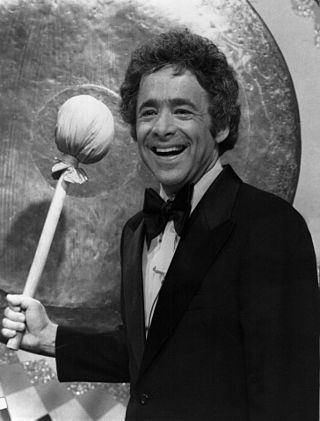
Charles Hirsch Barris was an American game show creator, producer, and host. Barris was known for hosting The Gong Show and creating The Dating Game and The Newlywed Game. He was also a songwriter who wrote "Palisades Park", recorded by Freddy Cannon and also recorded by Ramones. Barris wrote an autobiography titled Confessions of a Dangerous Mind, which was made into the film of the same title starring Sam Rockwell and directed by George Clooney.
A blooper is a short clip from a film or video production, usually a deleted scene, containing a mistake made by a member of the cast or crew. It also refers to an error made during a live radio or TV broadcast or news report, usually in terms of misspoken words or technical errors. The term blooper was popularized in the 1950s and 1960s in a series of record albums produced by Kermit Schafer entitled Pardon My Blooper, in which the definition of a blooper is thus given by the record series' narrator: "Unintended indiscretions before microphone and camera."

Richard Wagstaff Clark was an American television and radio personality and television producer who hosted American Bandstand from 1956 to 1989. He also hosted five incarnations of the Pyramid game show from 1973 to 1988 and Dick Clark's New Year's Rockin' Eve, which broadcast New Year's Eve celebrations in New York City's Times Square.

America's Funniest Home Videos, also called America's Funniest Videos, is an American video clip television series on ABC, based on the Japanese variety show Fun TV with Kato-chan and Ken-chan (1986–1992). The show features humorous homemade videos that are submitted by viewers. The most common videos feature unintentional physical comedy, pets or children and some staged pranks.
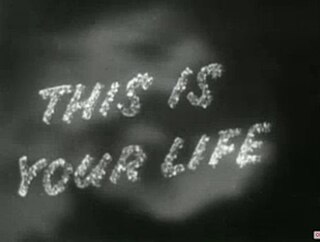
This Is Your Life is an American reality documentary series broadcast on NBC radio from 1948 to 1952, and on NBC television from 1952 to 1961. It was originally hosted by its creator and producer Ralph Edwards. In the program, the host surprised guests and then took them through a retrospective of their lives in front of an audience, including appearances by colleagues, friends, and family. Edwards revived the show in 1971–1972, and Joseph Campanella hosted a version in 1983. Edwards returned for various specials in the late 1980s.
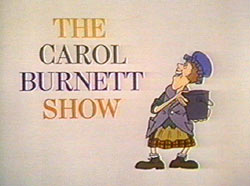
The Carol Burnett Show is an American variety/sketch comedy television show that originally ran on CBS from September 11, 1967, to March 29, 1978, for 279 episodes, and again with nine episodes in fall 1991. It starred Carol Burnett, Harvey Korman, Vicki Lawrence, and Lyle Waggoner. In 1975, frequent guest star Tim Conway became a regular cast member after Waggoner left the series. In 1977, Dick Van Dyke replaced Korman but it was agreed that he was not a match and he left after 10 episodes.

Steve Lawrence was an American singer, comedian, and actor. He was best known as a member of the pop vocal duo "Steve and Eydie" with his wife Eydie Gormé, and for his performance as Maury Sline, the manager and friend of the main characters in the 1980 film The Blues Brothers. Steve and Eydie first appeared together as regulars on Tonight Starring Steve Allen in 1954 and continued performing as a duo until Gormé's retirement in 2009.
An outtake is a portion of a work that is removed in the editing process and not included in the work's final, publicly released version. In the digital era, significant outtakes have been appended to CD and DVD reissues of many albums and films as bonus tracks or features, in film often, but not always, for the sake of humor. In terms of photos, an outtake may also mean the ones which are not released in the original set of photos.

A roast is a form of comedy, originating in American humor, in which a specific individual, a guest of honor, is subjected to jokes at their expense, intended to amuse the event's wider audience. Such events are intended to honor a specific individual in a unique way. In addition to jokes and insult comedy, such events may also involve genuine praise and tributes. The assumption is that the roastee can take the jokes in good humor and not as serious criticism or insult. The individual is surrounded by friends, fans, and well-wishers, who can receive some of the same treatment during the evening. The party and presentation itself are both referred to as a roast. The host of the event is called the roastmaster, since it rhymes with and plays on toastmaster. Anyone mocked in such a way is said to have been roasted.
Bizarre is a Canadian sketch comedy television series that aired from 1980 to 1986. The show was hosted by John Byner and produced by CTV at the CFTO's Glen Warren Studios in the Toronto suburb of Scarborough, Ontario for its first run, airing in Canada on CTV, and in the United States on the Showtime premium cable network.

C.P.O. Sharkey is an American sitcom television series, created by Aaron Ruben, that aired on NBC from December 1, 1976, to April 28, 1978. The series starred Don Rickles in the title role, with Peter Isacksen, Elizabeth Allen, Harrison Page, and Richard X. Slattery featured in the cast. Rickles, who actually served in the Navy during World War II, was already well-known for the indiscriminate insult comedy he used in his stand-up routines and in guest appearances on other TV shows and specials. C.P.O. Sharkey was the third TV series that provided him with a regular vehicle for his humor.
Insult comedy is a comedy genre in which the act consists mainly of offensive insults, usually directed at the audience or other performers. Typical targets for insult include people in the show's audience, the town hosting the performance, or the subject of a roast. An insult comedian often maintains a competitive and interactive relationship with their audience. The style has been described as "festive abuse". The style can be distinguished from an act based on satire, or political humor. Insult comedy is often used to deflect or silence hecklers even when the rest of the show is not focused on it.

TV's Bloopers & Practical Jokes is an American television series. Debuting as a weekly series, new episodes have been broadcast as infrequent specials during most of its run. It premiered on NBC in 1984, moved to ABC in 1998, and was revived in syndication in 2012. The NBC run of the series was co-produced by Carson Productions and Dick Clark Productions, and the ABC and syndication runs have been produced solely by Dick Clark Productions.
Fun Time was a non-serialised comedy TV show in Hong Kong in the 1980s. It was broadcast on Asia Television Limited (ATV).

The Don Rickles Show is an American comedy television series. The series stars Don Rickles, Louise Sorel, Erin Moran, Robert Hogan, and Joyce Van Patten. The series aired on CBS from January 14 until May 26, 1972. It ranked 56th out of 78 shows that season with an average 15.5 rating. It shares the same title as a short-lived variety series that Rickles had headlined on ABC in 1968.

Life's Most Embarrassing Moments is a series of television comedy specials primarily featuring "blooper" outtakes, and appeared on the ABC network in the United States from 1983 to 1986.

Bob Booker is an American writer and producer of television shows and record albums. He is best known for producing the 1962 album The First Family with Earle Doud. The album is a parody of President John F. Kennedy and his family, and it both remained at #1 on the Billboard 200 for 12 weeks and won a Grammy for Best Album of the Year in 1963.
References
- ↑ Booker, Bob (11 November 2015). Booker, Bob (November 1, 2015). Behind The Scenes In Hollywood. California: Bob Booker Productions, Inc. p. 280. ISBN 978-0615808338.
- Brooks, Tim and Marsh, Earle, The Complete Directory to Prime Time Network and Cable TV Shows